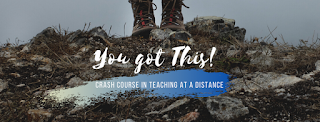
Byte Size Learning for teaching Online This blog is in the process of being updated.... I am pulling it out of the dust as a place to house more how to's for the coming weeks. Here are your top 3 things to know: Setup a communication system with your students that everyone can use. Examples are: Phone: simple phone calls to and from students and parents. Don't want to use your personal number? Create a Google Voice number . Also allows for text messaging. FREE Google Hangouts : Instant messaging with a google account, audio conferencing or video conferencing. FREE Zoom : Free web conferencing tool for video, audio or white board teaching. FREE with limits. Setup a way for you to give lessons, and send and receive assignments. Examples are: Use a lite Learning Management System, like Google Classroom or Schoology . Avoid using your email as it will get quickly cluttered and disorganized. Be bold and ask for help to set-up...




